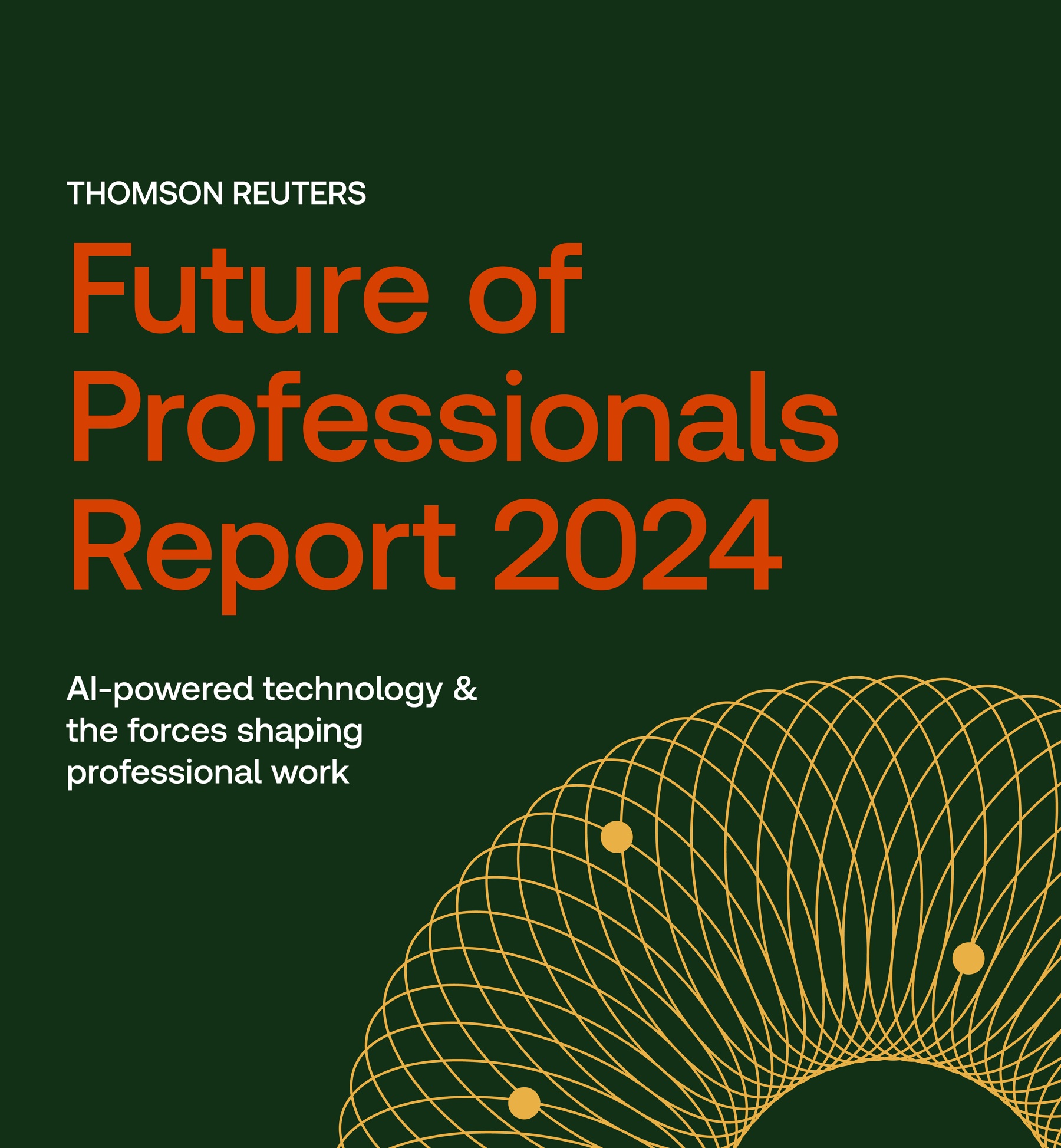Many risk and compliance professionals see AI as a “force for good” in their industry
As artificial intelligence (AI) becomes a strong force driving change within many workplaces, many professionals — particularly those working in corporations and within the risk, fraud & compliance profession — are seeing it as a force for good within their industry, according to a new survey report.
While 78% of all respondents said they believe AI is a force for good in their profession, one of the strongest endorsements came from the risk, fraud & compliance profession (in which 89% of respondents said this) and among those respondents working within corporations (84%).
This finding is contained in the Thomson Reuters 2nd annual Future of Professionals Report , which is based on a survey of more than 2,200 respondents across the legal, tax, trade, accounting, and risk, fraud & compliance fields, and within individual firms, corporate functions, and government agencies around the world.
According to the report, more than three-quarters (77%) of all survey respondents said they believe AI will have a high or transformational impact on their work over the next five years, indicating that the rise of AI is what they see propelling change in their respective professions. This, coupled with the overall positive “force for good” finding clearly shows that the overall market sentiment around AI use is positive, perhaps surprisingly so considering that many of the professionals surveyed are in fields — such as risk, fraud & compliance — that are known for risk aversion.
Today, many compliance and risk management professionals are trying to navigate a constantly changing and evolving regulatory landscape, as well as manage a growing volume and variety of data sources on which to base their decisions and risk assessments. They also have to balance the needs and expectations of multiple stakeholders, such as regulators, customers, employees, investors, and society at large.
Therefore, it may not be too surprising that they view powerful instruments such as AI and AI-driven tools as ways to augment their capabilities through data-driven automation and thereby enhance their value to their companies. Indeed, the sentiments expressed by risk, fraud & compliance professionals in the report underscores the potential impact of AI’s role in sifting through vast datasets and boosting productivity and efficiency, especially in in-house corporate functions, like compliance and risk management.
Applying GenAI to risk & compliance work
AI and its potentially more impactful offshoot, generative AI (GenAI), is already being used for various tasks in certain compliance and risk management functions, according to the report, which showed that three-quarters (75%) of risk management professionals were already using AI as a starting point to many work processes. And among those using AI, a large portion (60%) ranked AI as a “strong or very strong” starting point for their work.
And in the risk, fraud & compliance realm, there seems to be no shortage of the types of tasks that AI and GenAI can help make more efficient, faster, and less expensive to produce. For example, GenAI can help professionals manage risks. It potentially can generate compliance and risk reports, such as audit reports, regulatory filings, risk assessments, and compliance dashboards, based on the data and information available. GenAI can also generate summaries, highlights, and insights from these reports, to help the compliance and risk management professionals educate corporate management about the findings and encourage discussion on potential actions to take as well as other recommendations.
Further, when asked what tasks that conducted with the help of AI, many risk management respondents cited drafting, summarization, and research as the most common ways AI-powered tech has been used. In the research area, for example, respondents said they used AI for “basic research on tax technical topics and research for specific court cases and tax technical references” such as codes and regulations. They also used AI-powered solutions to “research high-level concepts that don’t require specific legal citations.”
Among summarization tasks, respondents said they used AI for “summarizing documents or action points from documents” and for “making documents easier to understand or improving clarity.” Others even used the technology for “summarizing calls and meetings.”
And in document creation — the kind of work GenAI seems designed to do — respondents said they were able to easily draft “an article based on materials, preparing a presentation, reviewing or summarizing a document, and asking questions.” Others noted they were able to create “first-draft emails, speaking notes, job descriptions” and more, even “drafting correspondence, and drafting opening and closing summaries.”
Clearly, many professionals in the risk, fraud & compliance field recognize the ability of AI and GenAI to enhance and augment the skills and knowledge they themselves already possess. However, many say the ultimate success of AI-driven technologies in the field will depend on continued human supervision. Indeed, almost 80% of risk, fraud & compliance respondents said that allowing AI to represent clients or to make final decisions on matters would be considered “a step too far.”
 |
Thomson Reuters is not a consumer reporting agency and none of its services or the data contained therein constitute a ‘consumer report’ as such term is defined in the Federal Fair Credit Reporting Act (FCRA), 15 U.S.C. sec. 1681 et seq. The data provided to you may not be used as a factor in consumer debt collection decisioning, establishing a consumer’s eligibility for credit, insurance, employment, government benefits, or housing, or for any other purpose authorized under the FCRA. By accessing one of our services, you agree not to use the service or data for any purpose authorized under the FCRA or in relation to taking an adverse action relating to a consumer application.










